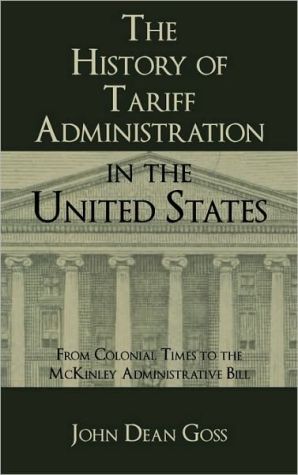

 |

|

The average rating for The History of Tariff Administration in the United States: From Colonial Times to the Mckinley Administrative Bill based on 2 reviews is 3.5 stars.
Review # 1 was written on 2017-08-27 00:00:00 David Mack David MackAn interesting interpretation of an essential question in the history of USFP: What should America's relationship to the world be? Brands spells out two schools of thought on this question: the vindicationist and exemplarist schools. Both schools exist within the spectrum of American exceptionalism because they both believe the US has a special role to play in world history. The vindicationists believe that American must go out into the world and shape in something like its own image. They must actively try to shape the international environment and stamp out or contain threats. He includes as vindicationists Mahan, TR, Social Darwinists, Wilson, Lippman, Kennan, Cold War liberals, Niebuhr, and neocons. Exemplarists, in contrast, believe that the best thing the US can do for the world is be that shining city on a hill, or an example of a functioning, prosperous democracy that doesn't cause trouble in the world and can be emulated by all. Many exemplarists believe it is too dangerous to go into the world with a crusading mindset, others think that the desire to do so has been implanted by manipulative capitalists, and others doubt that America has the knowledge, patience, or moral high ground to take this kind of action. He includes as exemplarists Jefferson (rhetorically, at least), most 19th century politicians, Charles Beard, Lincoln Steffens, and the Wisconsin historical school. Brands traces the back and forth between this groups in a series of long chapters covering major figures as representative of broader versions of exemplarist or vinidicationist thinking in a particular historical period. Most of these are excellent, and they don't just cover extremely well known figures. The back and forth of these groups holds the book's structure together nicely until the Cold War, when vindicationism became a consensus among both parties and ideological groups. Exemplarists largely retreated into the academy and the fringes of the left and right. The book remains interesting at that point, but the debate shifts to how/why the US should go out in the world rather than whether it should. I'd recommend this book for scholars of USFP or American politics in general. It would also be useful for someone comping in USFP to check out some of these chapters, which summarize important figures in accessible, interesting prose. I'd say this book pairs very well with Michael Hunt's Ideology and USFP, which is focused on the more unconscious cultural forces and assumptions that undergird much USFP. |
Review # 2 was written on 2020-06-20 00:00:00 Jared Nagel Jared NagelAmerica: A Prophecy is the long awaited collection from the writer Robert Christgau called, "one of the funniest men in Manhattan." From a hilarious spiritual guide to New York City--written after Sparrow tried meditating at a dozen high-traffic landmarks--to the scientific and religious significance of the sky, Sparrow's unique blend of wit and wisdom gives readers a whole new way of seeing our country at the crossroads. The author of Republican Like Me, Sparrow challenged Bob Dole for the presidential nomination in 1996 and, remarkably, lost. America: A Prophecy is his follow up, a fantastical look at a country in flux by a mischievous poet and iconoclastic comedian. |
CAN'T FIND WHAT YOU'RE LOOKING FOR? CLICK HERE!!!